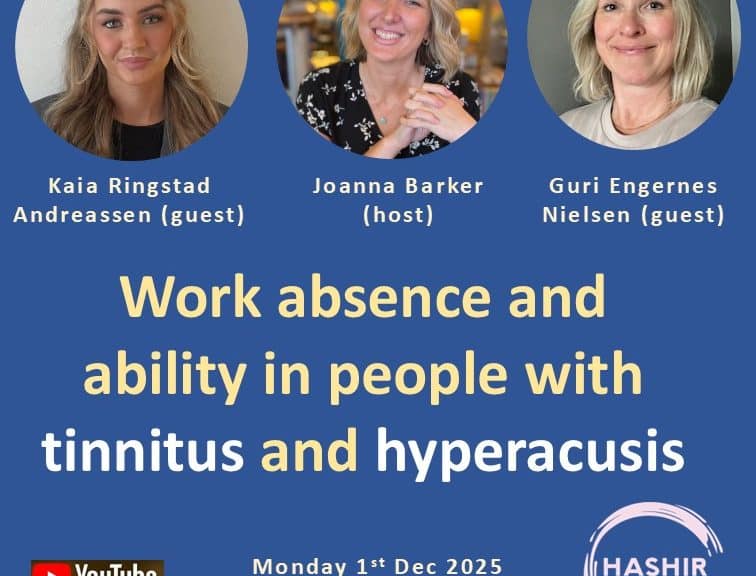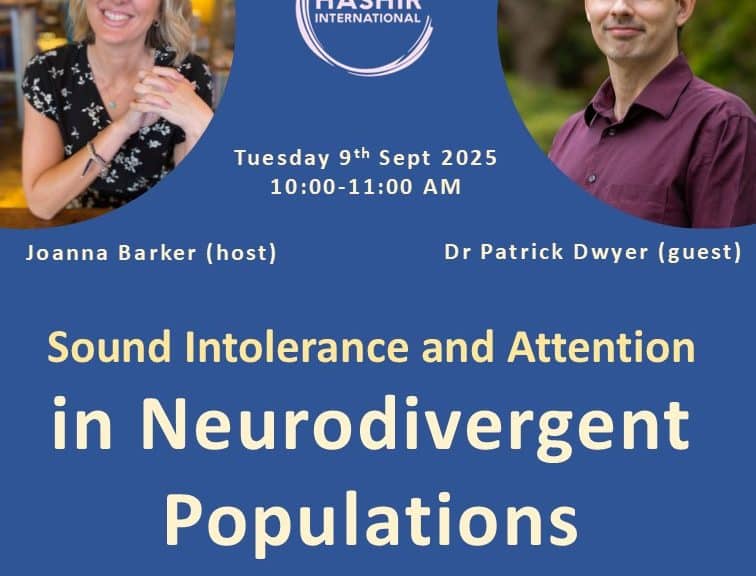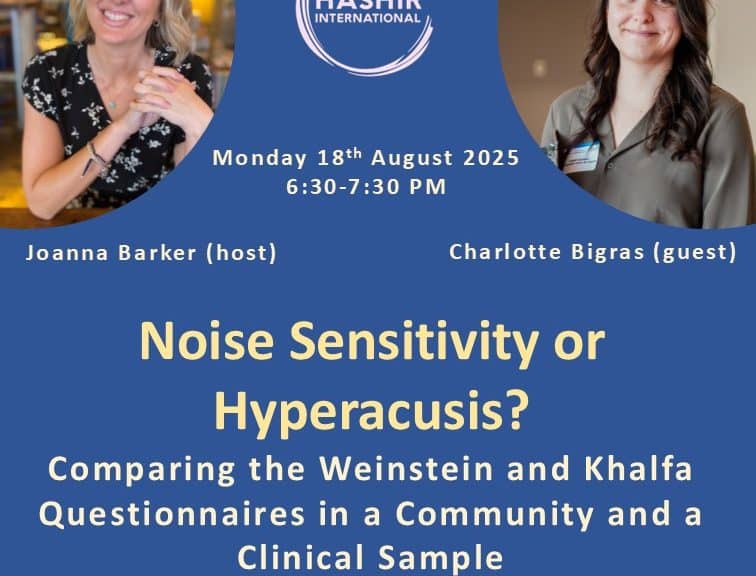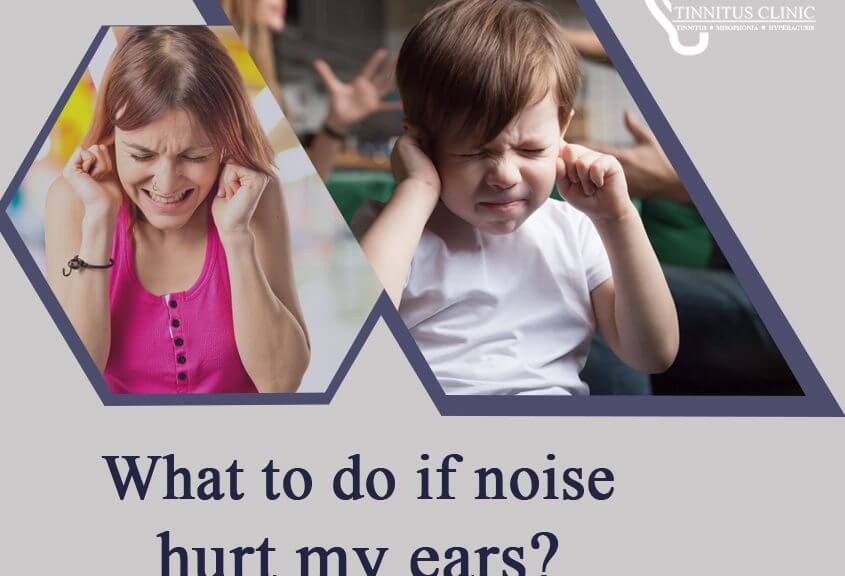
🎤 Patient Education Event
Tinnitus, Hyperacusis and Work: What the Research Shows
🗓 1st December 2025 | 🕖 7–8 PM (UK Time)
👥 With Kaia Ringstad Andreassen & Guri Engernes Nielsen
🎙 Hosted by Joanna Barker
How do tinnitus and hyperacusis affect people at work? Join us for an insightful session exploring new research from Norwegian hearing clinics, revealing that over 60% of adults with these conditions report reduced work ability—and hyperacusis plays a key role.
This talk highlights:
- The impact of sound sensitivity on different jobs
- Why hyperacusis matters more than we realise
- Practical implications for workplace support
Free and open to all. Join us live for this important conversation.

The guest speaker in our Patient Education Programme (PEP) planned for Tuesday 9th September 2025 at 10:00 to 11:00 AM (UK time) is Dr. Patrick Dwyer who is a Research Fellow from the Olga Tennison Autism Research Centre, School for Psychology and Public Health, La Trobe University, Bundoora, VIC, Australia! He will be talking about his latest research about Sound Intolerance and Attention in Neurodivergent Populations. Joanna Barker (Audiologist, Specialist in Tinnitus, Hyperacusis and Misophonia Rehabilitation) will be hosting this PEP meeting.
Although sensory differences in neurodivergent populations have often been described in relatively crude ways (as “hyperreactivity” versus “seeking,” for example), more recent research highlights the greater complexity of neurodivergent sensory experience. For example, this includes distinct phenotypes of sound intolerance such as misophonia and loudness intolerance/hyperacusis. However, these experiences remain poorly understood. One understudied factor that may be involved in such experiences is attention. With a primary focus on autism and a secondary focus on ADHD, this presentation will discuss commonly observed neurodivergent attention patterns such as hyper-focus, monotropism, and hypervigilance, and present data on how these may relate to experiences of sound intolerance as well as mental health challenges.

Our guest speaker is Charlotte Bigras (M.P.A) who will be giving us a talk on “Noise Sensitivity or Hyperacusis? Comparing the Weinstein and Khalfa Questionnaires in a Community and a Clinical Sample”.
Joanna Barker (Audiologist, Specialist in Tinnitus, Hyperacusis and Misophonia Rehabilitation) will be hosting this Patient Education online meeting. Our August meeting is planned for 18th August 2025 6:30 to 7:30 PM (UK time).
Charlotte will be sharing a presentation with us which examines how two tools, the Hyperacusis Questionnaire (HQ) and the Noise Sensitivity Scale (NSS), help us understand sound tolerance issues. By comparing their use in healthy adults and veterans, it reveals important insights into the overlap and differences between hyperacusis and noise sensitivity, shedding light on these often-misunderstood conditions.
There will be the chance to ask Charlotte any questions, so please join live to get her expert opinion on noise sensitivity and hyperacusis. This talk aims to empower people with the knowledge and tools to take control of their journey with these conditions. Are you taking CBT or planning to do so? This talk is for you!
This event is suitable for members of public who are interested to learn about tinnitus, hyperacusis and misophonia, patients, parents of children with hyperacusis or misophonia, students, Audiologists, Hearing therapists, Hearing aid dispensers, Psychologists, Psychiatrists, Otologists, Neurologists, Speech and language therapists, Occupational therapists, Nurses, Teachers of the deaf, social workers, General medicine, or other qualified health and social care disciplines.

We are delighted to welcome you to the second edition of the International Conference on Pharmacology & Gene Therapy for Tinnitus, a virtual gathering hosted from the United Kingdom. This focused half-day event brings together world-leading researchers and emerging voices in the fields of auditory neuroscience, pharmacology, genetics, and translational therapy. Our programme explores cutting-edge advances in tinnitus and hyperacusis research—from objective biomarkers and cortical imaging to novel pharmacological approaches and animal models.

If, day-to-day environmental sounds hurt your ears, then it is likely that you are experiencing
hyperacusis. Hyperacusis is intolerance of certain everyday sounds that causes significant distress and impairment in social, occupational, recreational, and other day-to-day activities. The sounds may be perceived as uncomfortably loud, unpleasant, frightening, or painful.
Tinnitus and hyperacusis often co-occur; about 55% of patients who have tinnitus also experience hyperacusis.
In patients with hyperacusis it seems that neurons that normally respond at higher sound levels begin to respond to sounds with lower intensities, leading to the perception of increased loudness. Hyperacusis typically is characterised by negative emotional reaction to environmental noises or sound in general. When a sound induces negative emotions, then the auditory system prioritise that sound and enhances its perception leading to the experience of hyperacusis. For majority of people who have hyperacusis there is no other underlying health condition.
See an ENT and/or psychiatrist for medical and mental health assessment.If your hyperacusis impacts on your day-to-day activities, then seek help from a specialist audiologist for therapy.
In presence of the trigger sounds, individuals with hyperacusis often exhibit an initial anxiety response resulting from the sensations of extreme loudness and sometimes pain in their ears or head. In individuals with hyperacusis-related distress, these initial hyperacusis symptoms are typically followed by a vicious cycle involving negative thoughts leading to negative emotions, physical sensations, and further negative thoughts which feed back into the patients initial reaction resulting in exacerbation of their symptoms.
A specialised method of
Cognitive Behavioural Therapy (CBT) which is a form of talking therapy has shown to be effective in management of hyperacusis. The CBT intervention for hyperacusis distress aims to break the vicious cycle by helping the individual to explore their negative thought processes and to modify them.
Dr. Aazhs research in collaboration with
University of Cambridge which is published in the American Journal of Audiology showed that on average in patients who receive hyperacusis-focused CBT, the impact of hyperacusis on their life is significantly reduced from 50% to 30%. Once the impact of hyperacusis on patients life is minimised, the improvement in the actual sensitivity to sound will follow.






